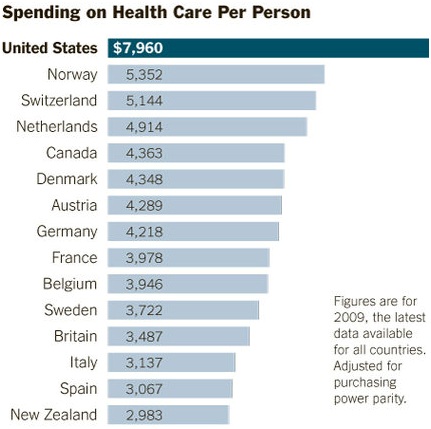Apparently Romney has decided that he can't win a referendum on Obama and thus it's time to more explicitly hitch his wagon to the GOP's radical agenda to revive his campaign.
So it's worth taking a moment this morning to remember that his new Number Two's plot to voucherize Medicare and shift costs onto the backs of future seniors doesn't save any money. It's ideological drivel that doesn't actually solve any problems that haven't already been solved. Why not? Because per enrollee spending growth in the public health insurance programs has already fallen.
Medicare and Medicaid Spending Trends and the Deficit Debate | NEJM
I'm sure Ryan and his sidekick Mittens will defend their scheme by saying it's necessary. Unfortunately for them, that's demonstrably false. The alleged goals of their plan have already been achieved. Dismantling Medicare, throwing seniors into the private insurance market, and shifting costs back onto seniors isn't necessary for fiscal reasons, it's purely ideological.
I suspect we'll hear more about the folly of their ideological agenda in the coming weeks.
So it's worth taking a moment this morning to remember that his new Number Two's plot to voucherize Medicare and shift costs onto the backs of future seniors doesn't save any money. It's ideological drivel that doesn't actually solve any problems that haven't already been solved. Why not? Because per enrollee spending growth in the public health insurance programs has already fallen.
Medicare and Medicaid Spending Trends and the Deficit Debate | NEJM
With the per-enrollee spending growth in Medicare and Medicaid less than that in private insurance and close to the growth in GDP per capita, it's hard to argue that spending on either program, on a per-enrollee basis, is out of control. Rather, per-enrollee growth in both programs is near the target often advocated in debt-reduction proposals. Total spending growth, which also includes growth in enrollment, is faster than the economy's growth. But policies that are appropriate when the problem is per-capita spending growth differ from those that make sense when enrollment growth is such an important cost driver. Policy options such as premium support and block grants that entail indexing growth rates to some measure of economic growth will have a hard time achieving lower per-enrollee spending growth than is currently projected. CBO estimates suggest that both approaches may achieve savings for the federal government, but such savings shift Medicare costs onto existing enrollees and, in the case of Medicaid, onto the states as well.3
Rather than pursuing major restructuring of either program, then, we should continue adopting available strategies to contain costs within the programs' current structure, especially since many of those implemented in the past decade seem to be working, and many on the horizon appear promising.
I'm sure Ryan and his sidekick Mittens will defend their scheme by saying it's necessary. Unfortunately for them, that's demonstrably false. The alleged goals of their plan have already been achieved. Dismantling Medicare, throwing seniors into the private insurance market, and shifting costs back onto seniors isn't necessary for fiscal reasons, it's purely ideological.
I suspect we'll hear more about the folly of their ideological agenda in the coming weeks.



